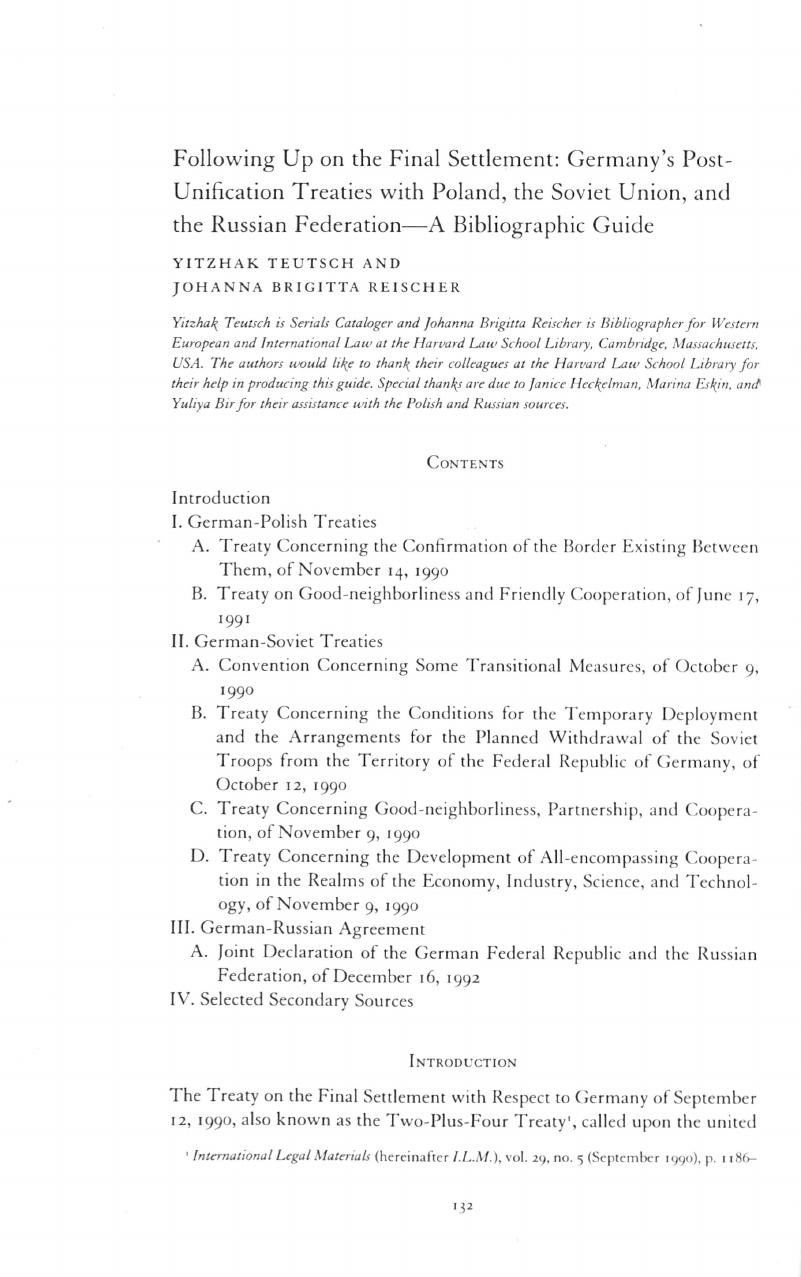No CrossRef data available.
Published online by Cambridge University Press: 28 February 2019

1 International Legal Materials (hereinafter I.L.M.). Vol. 29, No. 5 (September 1990), p. 1186–1193. This treaty is also known as the “Two-Plus-Four Treaty” because of the involvement of the two Germanies and the four Allies (U.S.S.R., U.S.A., Great Britain, and France).CrossRefGoogle Scholar
2 “Poland, Germany sign border treaty,” PAP News Wire in LEXIS/NEXIS, November 14. 1990.Google Scholar
3 Das Parlament, October 25, 1991, p. 1. See op. cit., p. 2–6, for the Bundestag debate of October 17, 1991.Google Scholar
4 “Sejm strongly but critically supports Polish-German treaties,” PAP News Wire in LEXIS/NEXIS, October 19, 1991.Google Scholar
5 “Poland, Germany exchange treaty ratifying documents,” PAP News Wire in LEXIS/NEXIS, January 16, 1992.Google Scholar
6 “Poland and Germany initial friendship treaty,” PAP News Wire in LEXIS/NEXIS, June 6, 1991.Google Scholar
7 “Poland, Germany sign landmark pact,” PAP News Wire in LEXIS/NEXIS, (une 17, 1991.Google Scholar
8 “Statement on the German-Polish Treaties made by Dr. Helmut Kohl … in the German Bundestag (excerpts), 6 September 1991: Translation of advance text,” p. 2. On file at the German Information Center, 950 Third Ave., New York, NY 10022.Google Scholar
9 Supra note 3.Google Scholar
10 Supra note 4.Google Scholar
11 Supra note 5.Google Scholar
12 “Germany and USSR sign transitional agreement on Soviet troops,” BBC Summary of World Broadcasts in LEXIS/NEXIS, October 11, 1990.Google Scholar
13 Bundestagsdrucksache 11/8153, p. 9.Google Scholar
14 “Bonn, Moscow initial treaty on relations,” The Week in Germany in LEXIS/NEXIS, September 14, 1990. Somewhat less diplomatic was the observation made by an anonymous U.S. State Department official at the time of the August 1991 coup d'état in Moscow: “That money is not aid. We look at it as a megabribe” (quoted in Mary Curtius, “Bush backs Yeltsin, shuns confrontation,” The Boston Globe in LEXIS/NEXIS, August 21, 1991).Google Scholar
15 “Bundestag approves treaty on Soviet troop withdrawal,” The Week in Germany in LEXIS/NEXIS, November 2, 1990.Google Scholar
16 “Soviet Parliament deliberations—daily round-up,” TASS in LEXIS/NEXIS, March 4, 1991.Google Scholar
17 “Soviet Parliament endorses all treaties with Germany,” TASS in LEXIS/NEXIS, April 2, 1991. See also Izvestia, April 3, 1991, p. 1 (quoted in part in Current Digest of the Soviet Press, Vol. 43, No. 14 [May 8, 1991], p. 17).Google Scholar
18 “Bonn and Moscow sign treaty on Soviet troops in Germany,” TASS in LEXIS/NEXIS, October 12, 1990.Google Scholar
19 Supra note 15.Google Scholar
20 Supra note 16.Google Scholar
21 Supra note 17.Google Scholar
22 “Soviet-German documents enter into effect,” TASS in LEXIS/NEXIS, May 6, 1991.Google Scholar
23 “Bonn, Moscow initial treaty on relations,” The Week, in Germany in LEXIS/NEXIS, September 14, 1990; Vestnik, October 15, 1990, p. 19.Google Scholar
24 “Gorbachev and Kohl sign treaty on ‘good-neighborliness,’ “ The Week in Germany in LEXIS/NEXIS, November 16, 1990.Google Scholar
25 “Soviet-German ‘good neighborliness’ treaty ratified,” The Week in Germany in LEXIS/NEXIS, April 26, 1991; Das Parlament, May 3, 1991, p. 1. See op. cit., p. 2–4, for the Bundestag debate.Google Scholar
26 “Soviet Parliament ratifies Soviet-German treaties,” TASS in LEXIS/NEXIS, March 4, 1991.Google Scholar
27 Das Parlament, July 12, 1991, p. 1.Google Scholar
29 Supra note 24.Google Scholar
29 Supra note 25.Google Scholar
30 Supra note 26.Google Scholar
31 “Germany gives debt help, cash in exchange for quicker Russian troop exit,” Agence France Presse in LEXIS/NEXIS, December 16, 1992.Google Scholar
32 Bulletin, no. 139 (December 22, 1992), p. 1267.Google Scholar